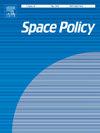ASEAN regional cooperation in the space sector: Current status, potential gaps, and future perspectives
IF 1.9
4区 社会学
Q2 INTERNATIONAL RELATIONS
引用次数: 0
Abstract
The Association of Southeast Asian Nations (ASEAN) has long participated in global space activities. At present, more and more member states are establishing space programs. An ASEAN new space economy is taking root, still in its infancy compared to those of global space powers. To assist policymakers in fostering the next stage of space development in ASEAN, this article provides a comprehensive review and analysis of the current status and potential gaps in regional space sector cooperation. Cross-cutting challenges are identified from a survey of previous studies. To unravel their causes and prospective solutions, a historical review of around 20 frameworks promoting regional space sector cooperation in ASEAN is performed. Then, interviews are conducted to enhance the assessment. These provide the perceived contributions of the frameworks from the point of view of the end user. Domains with mature and only nascent regional cooperation are thus identified. Mature regional cooperation is enjoyed in space-based remote sensing data research and utilisation, and short-term initiatives for targeted space capacity building. Only nascent cooperation exists to conduct long-term cross-sectoral space capacity building; foster entrepreneurship; develop regional policies and standards for space-related activities; and pool funding from within the region. In light of the recent establishment of several regional space agencies around the world, attention is drawn to an ASEAN Space Agency as an option to fill identified cooperation gaps.
东盟空间部门区域合作:现状、潜在差距和未来前景
东南亚国家联盟(东盟)长期以来一直参与全球空间活动。目前,越来越多的成员国正在建立空间计划。东盟新的太空经济正在生根发芽,但与全球太空大国相比仍处于起步阶段。为了帮助决策者促进东盟下一阶段的空间发展,本文对区域空间部门合作的现状和潜在差距进行了全面审查和分析。通过对以往研究的调查,确定了跨领域挑战。为了阐明其原因和未来的解决办法,对促进东盟区域空间部门合作的约20个框架进行了历史回顾。然后,进行访谈以加强评估。这些从最终用户的角度提供了框架的可感知贡献。因此,确定了具有成熟和刚刚起步的区域合作的领域。在天基遥感数据研究和利用方面开展了成熟的区域合作,并在有针对性的空间能力建设方面提出了短期倡议。开展长期跨部门空间能力建设的合作尚处于起步阶段;培养创业精神;为与空间有关的活动制定区域政策和标准;并从区域内筹集资金。鉴于最近在世界各地建立了若干区域空间机构,提请注意设立东盟空间机构,作为填补已查明的合作空白的一个选择。
本文章由计算机程序翻译,如有差异,请以英文原文为准。
求助全文
约1分钟内获得全文
求助全文
来源期刊

Space Policy
Multiple-
CiteScore
3.40
自引率
36.40%
发文量
40
期刊介绍:
Space Policy is an international, interdisciplinary journal which draws on the fields of international relations, economics, history, aerospace studies, security studies, development studies, political science and ethics to provide discussion and analysis of space activities in their political, economic, industrial, legal, cultural and social contexts. Alongside full-length papers, which are subject to a double-blind peer review system, the journal publishes opinion pieces, case studies and short reports and, in so doing, it aims to provide a forum for the exchange of ideas and opinions and a means by which authors can alert policy makers and international organizations to their views. Space Policy is also a journal of record, reproducing, in whole or part, official documents such as treaties, space agency plans or government reports relevant to the space community. Views expressed in the journal are not necessarily those of the editors or members of the editorial board.
 求助内容:
求助内容: 应助结果提醒方式:
应助结果提醒方式:


